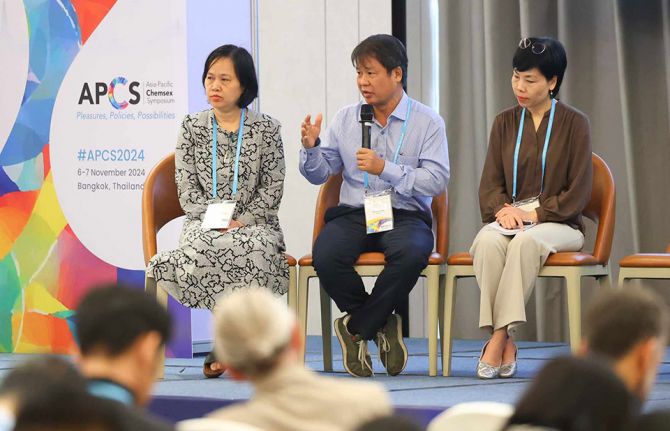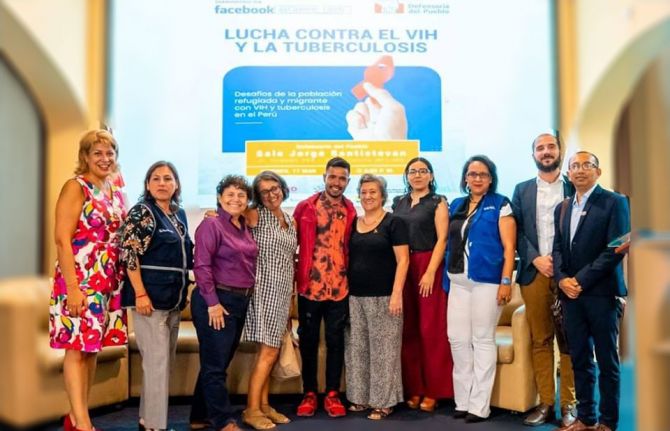
Feature Story
SEROvie’s evolving MSM strategy
25 July 2012
25 July 2012 25 July 2012
Minister of Health and Social Affairs of France, Marisol Touraine (centre) presents the Red Ribbon Award to representatives of community-based organization Fondation SEROvie during International AIDS conference in Washington, DC on 25 July 2012.
Credit: UNAIDS/Y.Gripas
The Haitian civil society organization SEROvie was one of the 10 community-based organizations who won a Red Ribbon Award this week for its work in the prevention of sexual HIV transmission.
During its 14 year existence the group has repeatedly switched strategy. First they cast themselves as HIV educators, raising awareness everywhere from schools to church groups. Gradually they began talking gender, explaining to Haitians how prejudice and power-dynamics upped some people’s HIV risk. This ground-work was necessary to venture where they really wished to work—with the neglected gay, bisexual, sex worker and transgender communities.
“There was nothing for them then,” reflects executive director Steeve Laguerre. “Before we started, the men who have sex with men (MSM) didn’t know where to go to get HIV services. When they went to the usual sites they were not welcome at all so they were afraid to go. They were dying at home, alone.”
SEROvie conducts HIV prevention, health referrals, and psychological and social support, as well as home-based care visits, vocational training and a micro-credit programme. Today, 10% of the organization’s 4 000 beneficiaries are living with HIV and are accessing antiretroviral treatment and connecting with others through support group systems. Over the years SEROvie has fostered relationships with a range of community-friendly services. These are places where MSM and transgender people can get non-judgmental care along with information that is relevant to their lives. For Laguerre the key to serving this hard-to-reach community is, above all else, listening.
“We had to learn not to impose activities, interventions and services that we thought were a good idea. You need to listen to the community. Your programme interventions need to come from them and then you will be successful. What we did at first was think to ourselves ‘Let’s have such and such training. I am sure they need it’. Then you are asking yourself why they are not showing up,” Laguerre reasons.
We had to learn not to impose activities, interventions and services that we thought were a good idea. You need to listen to the community. Your programme interventions need to come from them and then you will be successful
SEROvie executive director Steeve Laguerre
It’s through this approach that the organization came up with its most recent incarnation. Today SEROvie supports the development of a lesbian gay, bisexual and transgender (LGBT) network throughout Haiti while providing MSM with education opportunities and job training. One man might want help to pursue a degree. Another may wish to set up a hairdressing service in his village. Some would like to fix computers, cook or drive cars. More than 500 persons have been trained in this way. But what do hairdressing and driving have to do with HIV?
“We were providing sensitization regarding HIV and sexually transmitted infections (STIs) and then we asked ‘What’s next?’ We asked the men and they said ‘We are not working. We would like to work’,” Laguerre recounts. By empowering the community economically, the men are more empowered about their sexual decision-making as the vulnerabilities MSM face everywhere are intensified by poverty.
Asked what advice he would offer other Caribbean non-governmental organisations (NGOs) on pressing the political class for action on behalf of marginalized and vulnerable groups, Laguerre stresses the importance of obstinate persistence.
“It takes constant work to build a relationship. You need to invite them within the institution so they can see what exactly you are doing. You need to send reports to them. You have to force communication with them,” he says.
That strategy is paying off. Recently Haiti’s Ministry of Health approved funding and asked SEROvie to help them implement activities for the LGBT community and sex workers in ten districts throughout the country.
“That,” Laguerre says with a satisfied smile, “is a first.”
Ten community-based organizations, which have shown exceptional and inspiring action on AIDS were honoured with the 2012 Red Ribbon Award in a special session of the XIX International AIDS Conference (AIDS 2012) on Wednesday. The Red Ribbon Award is the world's leading award for innovative and outstanding community work in the response to the AIDS epidemic.


